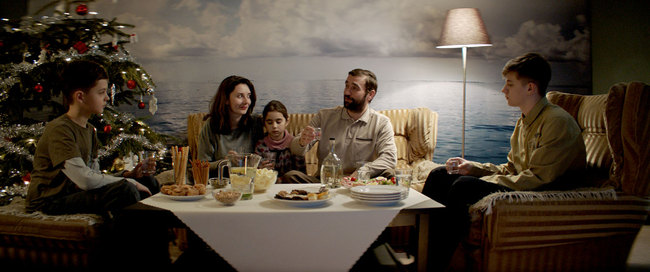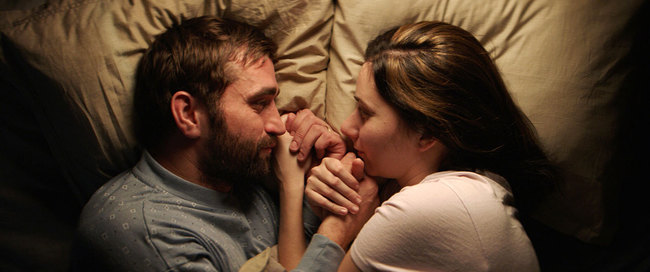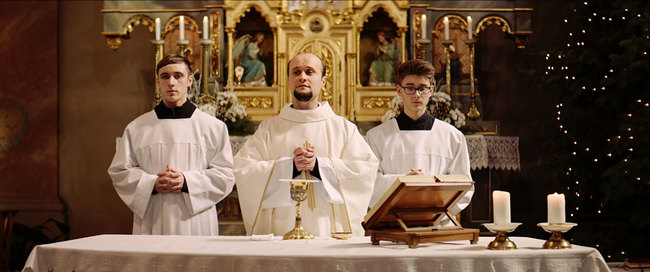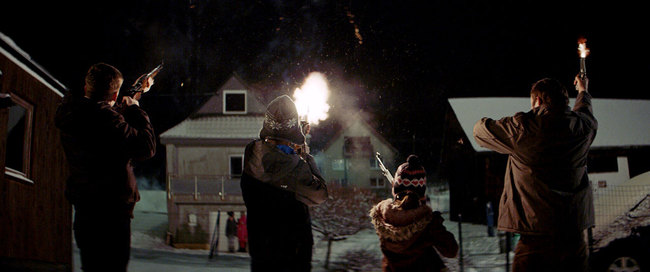Oscars 2020 Review: LET THERE BE LIGHT, In the Name of Father, Son and Far-Right Extremism

The successful Slovak documentarist and producer Marko Škop moved to fiction filmmaking in 2015 as he unveiled his feature fiction debut Eva Nová that went on accolade-netting spree afterward. The director remained seated in the chair of fiction filmmaking as he worked on his following project Let There Be Light. Revealed in the main competition at the Karlovy Vary International Film Festival where the film received a special mention from Ecumenical jury and the leading actor Milan Ondrík won the Best Actor award. Slovak Film and Television Academy voted the film as the country's bid for Best International Feature Film at the 92nd Academy Awards.
Škop said the primary impetus to switch the forms was because of respecting a certain ethical border. He desires to explore topics without putting protagonists to risk. And the environment of fiction film enables him to plunger into sensitive themes in the safe space. As an example, he uses Ulrich Seidl´s drama Dog Days, he is a fan of.
The fiction feature debut Eva Nová was largely an intimate drama about an aged actress who lost career and son because of alcohol. The plot revolves around her attempt to seek reconciliation with her adult son and his family. Let There Be Light which Škop also wrote and produced (co-production with the Czech Republic), weaves a several narrative strands together in a larger plot framework of social drama. However, similarly to Eva Nová, a family drama is the beating heart of the film.
Milan (portrayed by Milan Ondrík of Eva Nová), a fortysomething father of three kids and the film´s conflicted yet highly relatable protagonist works in Germany while his wife Zuzana rears kids back home in a rustic village in Slovakia. Milan is coming back home for Christmas and the holidays of love and peace are disrupted by suicide of a young boy in the village. Police visit Milan´s home since the dead boy was a classmate of his oldest son. Soon, Milan faces a grim reality check after finding out his son became radicalized in his absence by a far-right paramilitary troop.
The theme of far-right extremism has been looming in the Slovak cinema for some time. Mira Fornay touched upon it in My Dog Killer mostly in easily read implications while Jan Gebert´s observational documentary When the War Comes depicts how the young generation falls into the tenets of far-right selling xenophobia as nationalism.
These films follow a trajectory of current socio-political climate that is familiar from other countries where populists and closeted fascists run around offering simple answers to complicated, and at some cases uneven inexisting, problems.
Škop´s story unfolds in this very same climate although set into conditions and circumstances belonging to the domestic environment in a zeitgeist manner. Economic migration became a necessity in many households in poorer regions, the toll it takes on families is also one of the central motifs in Let There Be Light.
Locating the story into a parochial village, obviusoly a conscious choice as Škop deeply researched the topics of gasterbeiters, means adhering to certain conventions and traditions, what the writer-director employs in a form of motifs evolving into parallel storylines. Two figures personify the motifs, Milan´s father and a local priest. A larger generational schism divides Milan and his reserved and cold father what leads to a tense and strained relationship.
One the other hand, a catholic priest emerges as a specific archetypal character proclaiming to protect traditional values what coincidently is the very same language far-right extremists are pushing. Furthermore, clerofascism has a recorded history in Slovakia from the times when the country served as a puppet state to Nazi Germany during WWII, a catholic priest Jozef Tiso (a hero to local far-righters venerated by several priests as well) was put into the presidential seat who, among other deeds, agreed to Jew deportations to Auschwitz (he was executed for treason after the war).
Milan´s father remains a cipher which is largely for the benefit of the story while the (clerofascist) priest is awkwardly childish sporting a huge oedipal complex (however, it would explain his engagement in the paramilitary troop where he seems to wield almost ideological power over local youth).
The fatherly instinct prompts Milan to protect his child from undesired influence as his son has managed to adopt not only the xenophobic rhetoric but the far-right worldview as well. The schoolmate´s suicide was not a coincidence and Milan´ attempt to pluck his eldest child from the clasp of the local paramilitary brigade and extremist ideology put the whole family into danger. And the local priest is not too happy that Milan is behaving in such a socially disruptive manner.
Škop is juggling several topics and motifs to create a plastic portrayal of family and society amid specific circumstances that became to define the current period. The writer-director is very careful in designing the plotline, arranging parallel storylines while not overloading or obfuscating his narration.
The result is seemingly linear storytelling though such perception stems from delicately paced rhythm and plot development with regard to a rising tension (and eventually a breaking point) between Milan´s family and the rest of village. Ultimately, Let There Be Light is more complex and dense in meaning and implications than the plot may appear to carry on the surface.
The cinematographer Ján Meliš,who won cinematography award for his camerawork on Eva Nová, returned behind the camera on Škop´s sophomore fiction feature. The biblical title of the film translates into overall aesthetics as the director confirmed that the contrast of light and darkness was very important for the story and the film. The contrast has literal and figurative meaning perceptible throughout the whole film. Based on the visual poetics, Let There Be Light falls unmistakably into the category of social realistic dramas of the Central and Eastern European cut.
Škop´s previous experiences from documentary filmmaking shaped his realist style. Even though avoiding any stylistic or formalistic pyrotechnics, apart from the interplay of light and shadow, the creative team of Meliš, Škop and František Krähenbiel (who commented on the script in its development phase) who edited the film, are well versed in the language of fiction filmmaking. They render scenes of confrontation and conflict with adequate intensity, while the pressure is rising to harsh denouement when his whole family becomes the target of a vindictive rage metastasizing into a conspiracy thriller.
Let There Be Light is a multilayered drama depicting struggles of a family in a collective social portrait where radicalization is the answer in economically less fortunate regions. Yet this is just one symptom that Škop touches upon. The film addresses more issues pertaining to the current times and not solely in the poorer regions of Central and Eastern European countries. The writer-director turns to the topics of fatherhood, masculinity, intergenerational gap and father figures.
Škop´s latest drama is a meticulously crafted piece of realist cinema where the writer-director takes on a complex topic he treats with corresponding seriousness and urgency and film language. While the film may be a complex of a myriad of motifs coagulating, the final result is an audience-oriented family drama transcending to a larger and timely social context.
Let There Be Light
Director(s)
- Marko Skop
Writer(s)
- Frantisek Krähenbiel (dramaturge)
- Zuzana Liová (dramaturge)
- Marko Skop
Cast
- Andreas Nickl
- Dieter Fischer
- Milan Ondrík
- Csongor Kassai











